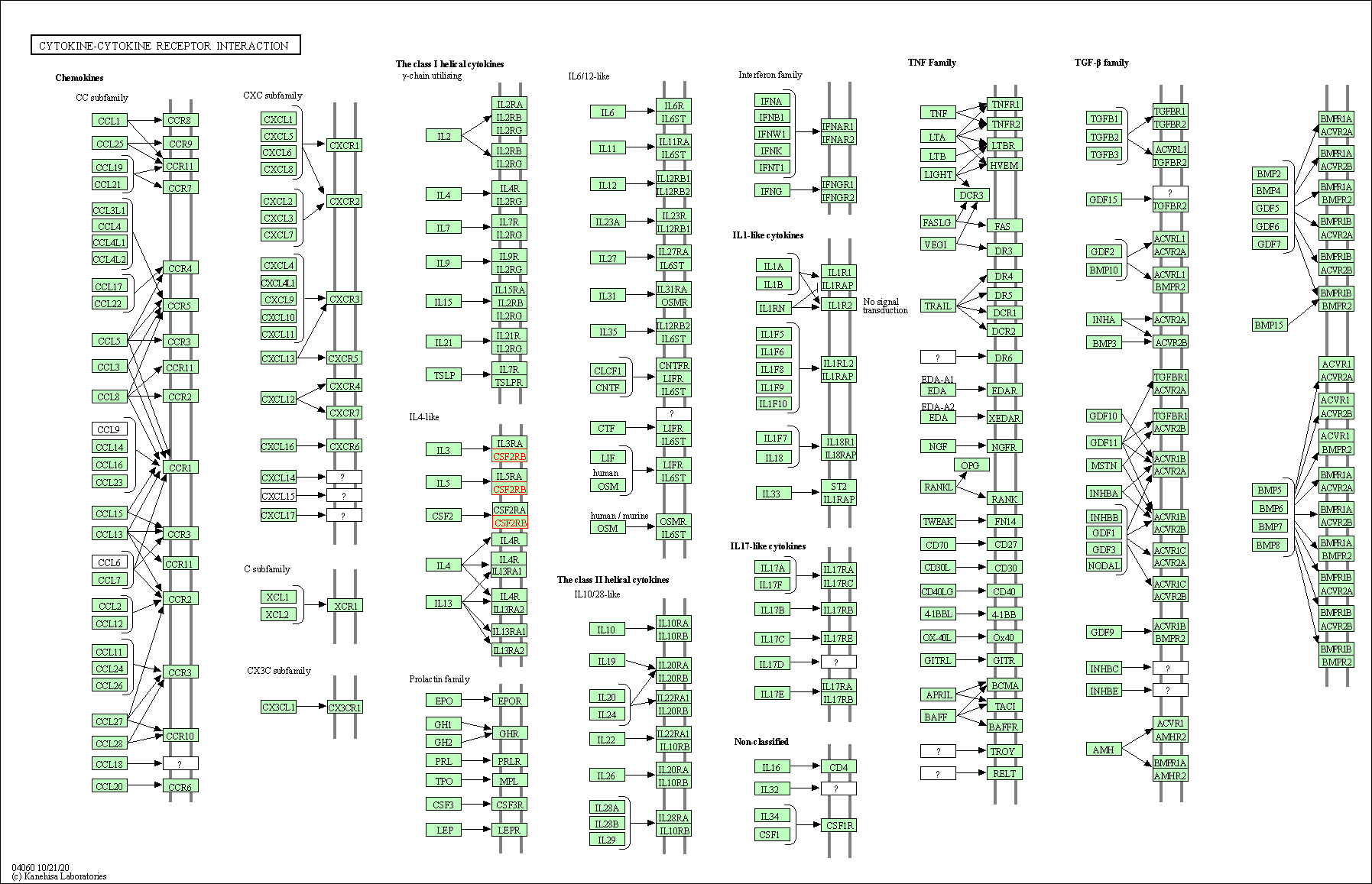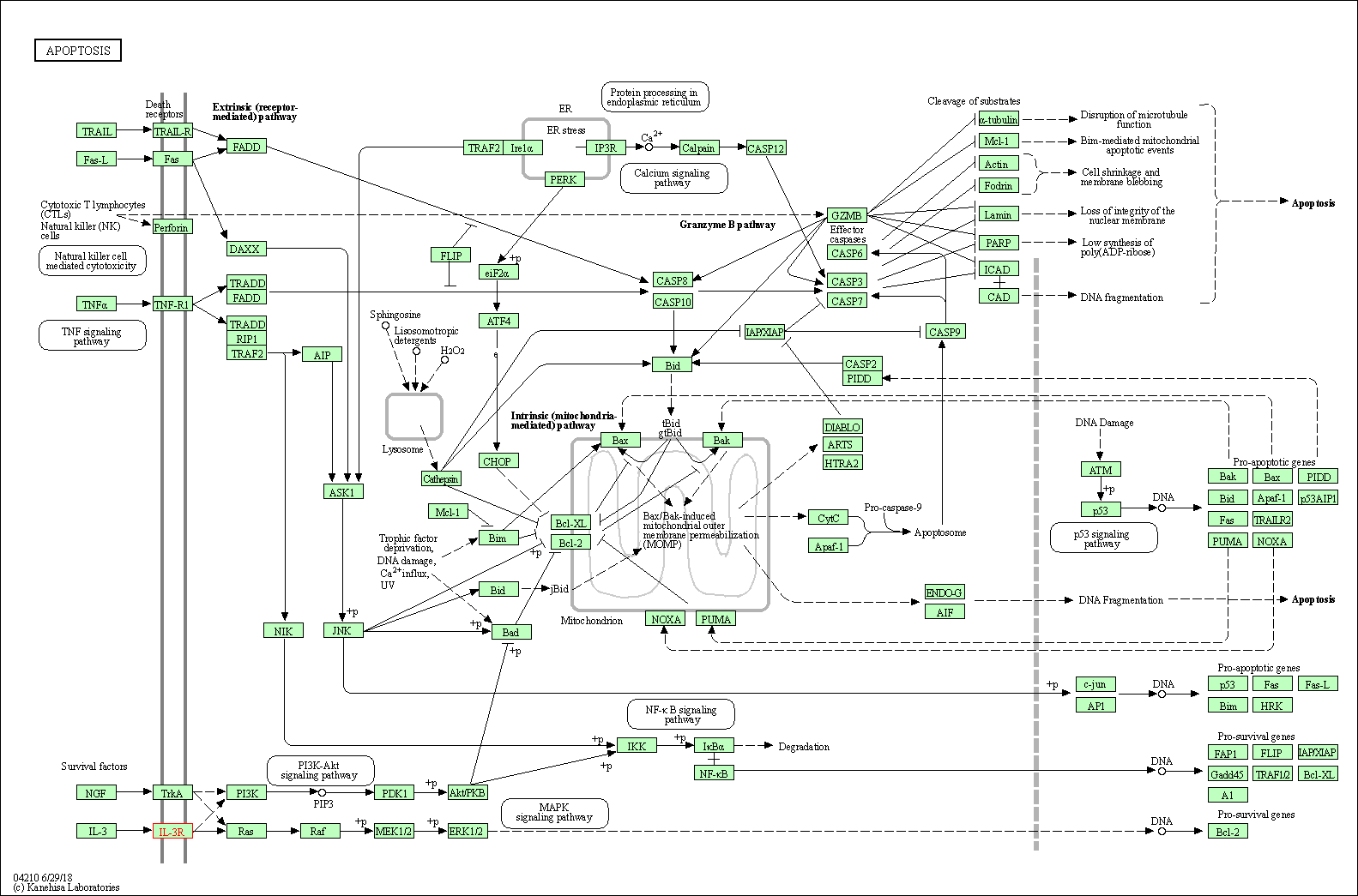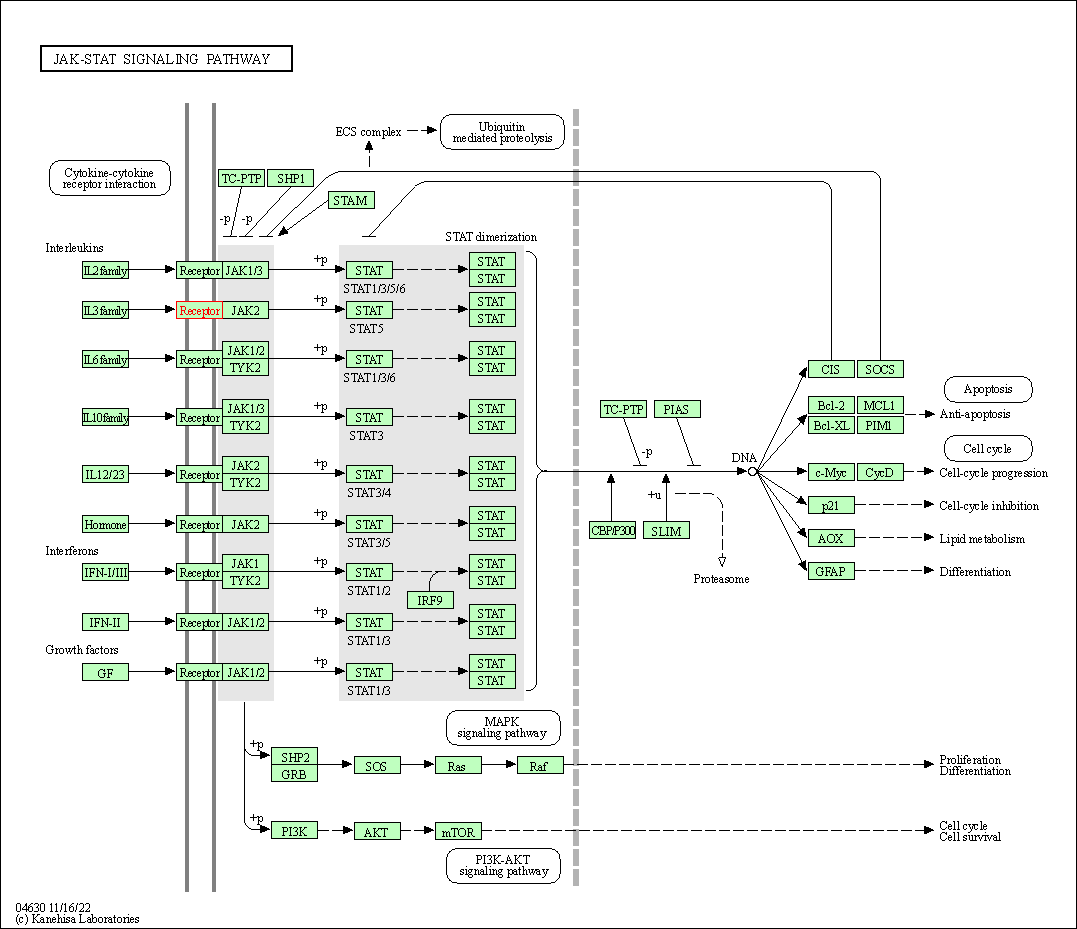Target Information
| Target General Information | Top | |||||
|---|---|---|---|---|---|---|
| Target ID |
T44589
(Former ID: TTDI01800)
|
|||||
| Target Name |
Interleukin 3 receptor (CSF2RB)
|
|||||
| Synonyms |
IL5RB; IL3RB; IL-5R; GM-CSF/IL-3/IL-5 receptor common beta subunit; Cytokine receptor common subunit beta; CDw131; CD131
Click to Show/Hide
|
|||||
| Gene Name |
CSF2RB
|
|||||
| Target Type |
Clinical trial target
|
[1] | ||||
| Disease | [+] 5 Target-related Diseases | + | ||||
| 1 | Asthma [ICD-11: CA23] | |||||
| 2 | Immune system disease [ICD-11: 4A01-4B41] | |||||
| 3 | Acute myeloid leukaemia [ICD-11: 2A60] | |||||
| 4 | Multiple myeloma [ICD-11: 2A83] | |||||
| 5 | Myeloproliferative neoplasm [ICD-11: 2A20] | |||||
| Function |
High affinity receptor for interleukin-3, interleukin-5 and granulocyte-macrophage colony-stimulating factor.
Click to Show/Hide
|
|||||
| BioChemical Class |
Cytokine receptor
|
|||||
| UniProt ID | ||||||
| Sequence |
MVLAQGLLSMALLALCWERSLAGAEETIPLQTLRCYNDYTSHITCRWADTQDAQRLVNVT
LIRRVNEDLLEPVSCDLSDDMPWSACPHPRCVPRRCVIPCQSFVVTDVDYFSFQPDRPLG TRLTVTLTQHVQPPEPRDLQISTDQDHFLLTWSVALGSPQSHWLSPGDLEFEVVYKRLQD SWEDAAILLSNTSQATLGPEHLMPSSTYVARVRTRLAPGSRLSGRPSKWSPEVCWDSQPG DEAQPQNLECFFDGAAVLSCSWEVRKEVASSVSFGLFYKPSPDAGEEECSPVLREGLGSL HTRHHCQIPVPDPATHGQYIVSVQPRRAEKHIKSSVNIQMAPPSLNVTKDGDSYSLRWET MKMRYEHIDHTFEIQYRKDTATWKDSKTETLQNAHSMALPALEPSTRYWARVRVRTSRTG YNGIWSEWSEARSWDTESVLPMWVLALIVIFLTIAVLLALRFCGIYGYRLRRKWEEKIPN PSKSHLFQNGSAELWPPGSMSAFTSGSPPHQGPWGSRFPELEGVFPVGFGDSEVSPLTIE DPKHVCDPPSGPDTTPAASDLPTEQPPSPQPGPPAASHTPEKQASSFDFNGPYLGPPHSR SLPDILGQPEPPQEGGSQKSPPPGSLEYLCLPAGGQVQLVPLAQAMGPGQAVEVERRPSQ GAAGSPSLESGGGPAPPALGPRVGGQDQKDSPVAIPMSSGDTEDPGVASGYVSSADLVFT PNSGASSVSLVPSLGLPSDQTPSLCPGLASGPPGAPGPVKSGFEGYVELPPIEGRSPRSP RNNPVPPEAKSPVLNPGERPADVSPTSPQPEGLLVLQQVGDYCFLPGLGPGPLSLRSKPS SPGPGPEIKNLDQAFQVKKPPGQAVPQVPVIQLFKALKQQDYLSLPPWEVNKPGEVC Click to Show/Hide
|
|||||
| 3D Structure | Click to Show 3D Structure of This Target | AlphaFold | ||||
| Drugs and Modes of Action | Top | |||||
|---|---|---|---|---|---|---|
| Clinical Trial Drug(s) | [+] 4 Clinical Trial Drugs | + | ||||
| 1 | Leridistim | Drug Info | Phase 2 | Immune System disease | [2] | |
| 2 | TPI ASM8 | Drug Info | Phase 2 | Asthma | [3] | |
| 3 | DT388IL-3 | Drug Info | Phase 1/2 | Acute myeloid leukaemia | [5] | |
| 4 | CSL-362 | Drug Info | Phase 1 | Acute myeloid leukaemia | [6] | |
| Mode of Action | [+] 3 Modes of Action | + | ||||
| Agonist | [+] 1 Agonist drugs | + | ||||
| 1 | Leridistim | Drug Info | [1] | |||
| Modulator | [+] 1 Modulator drugs | + | ||||
| 1 | TPI ASM8 | Drug Info | [7] | |||
| Inhibitor | [+] 1 Inhibitor drugs | + | ||||
| 1 | DT388IL-3 | Drug Info | [8] | |||
| Cell-based Target Expression Variations | Top | |||||
|---|---|---|---|---|---|---|
| Cell-based Target Expression Variations | ||||||
| Different Human System Profiles of Target | Top |
|---|---|
|
Human Similarity Proteins
of target is determined by comparing the sequence similarity of all human proteins with the target based on BLAST. The similarity proteins for a target are defined as the proteins with E-value < 0.005 and outside the protein families of the target.
A target that has fewer human similarity proteins outside its family is commonly regarded to possess a greater capacity to avoid undesired interactions and thus increase the possibility of finding successful drugs
(Brief Bioinform, 21: 649-662, 2020).
Human Pathway Affiliation
of target is determined by the life-essential pathways provided on KEGG database. The target-affiliated pathways were defined based on the following two criteria (a) the pathways of the studied target should be life-essential for both healthy individuals and patients, and (b) the studied target should occupy an upstream position in the pathways and therefore had the ability to regulate biological function.
Targets involved in a fewer pathways have greater likelihood to be successfully developed, while those associated with more human pathways increase the chance of undesirable interferences with other human processes
(Pharmacol Rev, 58: 259-279, 2006).
Biological Network Descriptors
of target is determined based on a human protein-protein interactions (PPI) network consisting of 9,309 proteins and 52,713 PPIs, which were with a high confidence score of ≥ 0.95 collected from STRING database.
The network properties of targets based on protein-protein interactions (PPIs) have been widely adopted for the assessment of target’s druggability. Proteins with high node degree tend to have a high impact on network function through multiple interactions, while proteins with high betweenness centrality are regarded to be central for communication in interaction networks and regulate the flow of signaling information
(Front Pharmacol, 9, 1245, 2018;
Curr Opin Struct Biol. 44:134-142, 2017).
Human Similarity Proteins
Human Pathway Affiliation
Biological Network Descriptors
|
|
| KEGG Pathway | Pathway ID | Affiliated Target | Pathway Map |
|---|---|---|---|
| Cytokine-cytokine receptor interaction | hsa04060 | Affiliated Target |

|
| Class: Environmental Information Processing => Signaling molecules and interaction | Pathway Hierarchy | ||
| Apoptosis | hsa04210 | Affiliated Target |

|
| Class: Cellular Processes => Cell growth and death | Pathway Hierarchy | ||
| JAK-STAT signaling pathway | hsa04630 | Affiliated Target |

|
| Class: Environmental Information Processing => Signal transduction | Pathway Hierarchy | ||
| Degree | 14 | Degree centrality | 1.50E-03 | Betweenness centrality | 1.68E-04 |
|---|---|---|---|---|---|
| Closeness centrality | 2.30E-01 | Radiality | 1.40E+01 | Clustering coefficient | 3.63E-01 |
| Neighborhood connectivity | 4.46E+01 | Topological coefficient | 1.41E-01 | Eccentricity | 11 |
| Download | Click to Download the Full PPI Network of This Target | ||||
| Target Regulators | Top | |||||
|---|---|---|---|---|---|---|
| Target-interacting Proteins | ||||||
| Target Affiliated Biological Pathways | Top | |||||
|---|---|---|---|---|---|---|
| KEGG Pathway | [+] 5 KEGG Pathways | + | ||||
| 1 | Cytokine-cytokine receptor interaction | |||||
| 2 | PI3K-Akt signaling pathway | |||||
| 3 | Apoptosis | |||||
| 4 | Jak-STAT signaling pathway | |||||
| 5 | Hematopoietic cell lineage | |||||
| Reactome | [+] 6 Reactome Pathways | + | ||||
| 1 | GPVI-mediated activation cascade | |||||
| 2 | G beta:gamma signalling through PI3Kgamma | |||||
| 3 | Interleukin-3, 5 and GM-CSF signaling | |||||
| 4 | RAF/MAP kinase cascade | |||||
| 5 | Surfactant metabolism | |||||
| 6 | Interleukin receptor SHC signaling | |||||
| WikiPathways | [+] 3 WikiPathways | + | ||||
| 1 | IL-3 Signaling Pathway | |||||
| 2 | Interleukin-2 signaling | |||||
| 3 | Interleukin-3, 5 and GM-CSF signaling | |||||
| References | Top | |||||
|---|---|---|---|---|---|---|
| REF 1 | Leridistim, a chimeric dual G-CSF and IL-3 receptor agonist, enhances multilineage hematopoietic recovery in a nonhuman primate model of radiation-induced myelosuppression: effect of schedule, dose, and route of administration. Stem Cells. 2001;19(6):522-33. | |||||
| REF 2 | ClinicalTrials.gov (NCT00004215) Leridistim Compared With Filgrastim in Treating Older Patients With Acute Myeloid Leukemia. U.S. National Institutes of Health. | |||||
| REF 3 | ClinicalTrials.gov (NCT01158898) Efficacy of TPI ASM8 During a 14-Day Allergen Challenge. U.S. National Institutes of Health. | |||||
| REF 4 | ClinicalTrials.gov (NCT02113982) SL-401 in Patients With Blastic Plasmacytoid Dendritic Cell Neoplasm or Acute Myeloid Leukemia. U.S. National Institutes of Health. | |||||
| REF 5 | ClinicalTrials.gov (NCT00397579) DT388IL3 Fusion Protein in Treating Patients With Acute Myeloid Leukemia or Myelodysplastic Syndromes. U.S. National Institutes of Health. | |||||
| REF 6 | ClinicalTrials.gov (NCT01632852) A Study of CSL362 in Patients With CD123+ Acute Myeloid Leukemia Currently in Remission. U.S. National Institutes of Health. | |||||
| REF 7 | Target mRNA inhibition by oligonucleotide drugs in man. Nucleic Acids Res.2012 Nov;40(21):10585-95. | |||||
| REF 8 | Safety evaluation of DT388IL3, a diphtheria toxin/interleukin 3 fusion protein, in the cynomolgus monkey. Cancer Immunol Immunother. 2005 Aug;54(8):799-806. | |||||
| REF 9 | Monoclonal antibody targeting of IL-3 receptor alpha with CSL362 effectively depletes CML progenitor and stem cells. Blood. 2014 Feb 20;123(8):1218-28. | |||||
If You Find Any Error in Data or Bug in Web Service, Please Kindly Report It to Dr. Zhou and Dr. Zhang.

